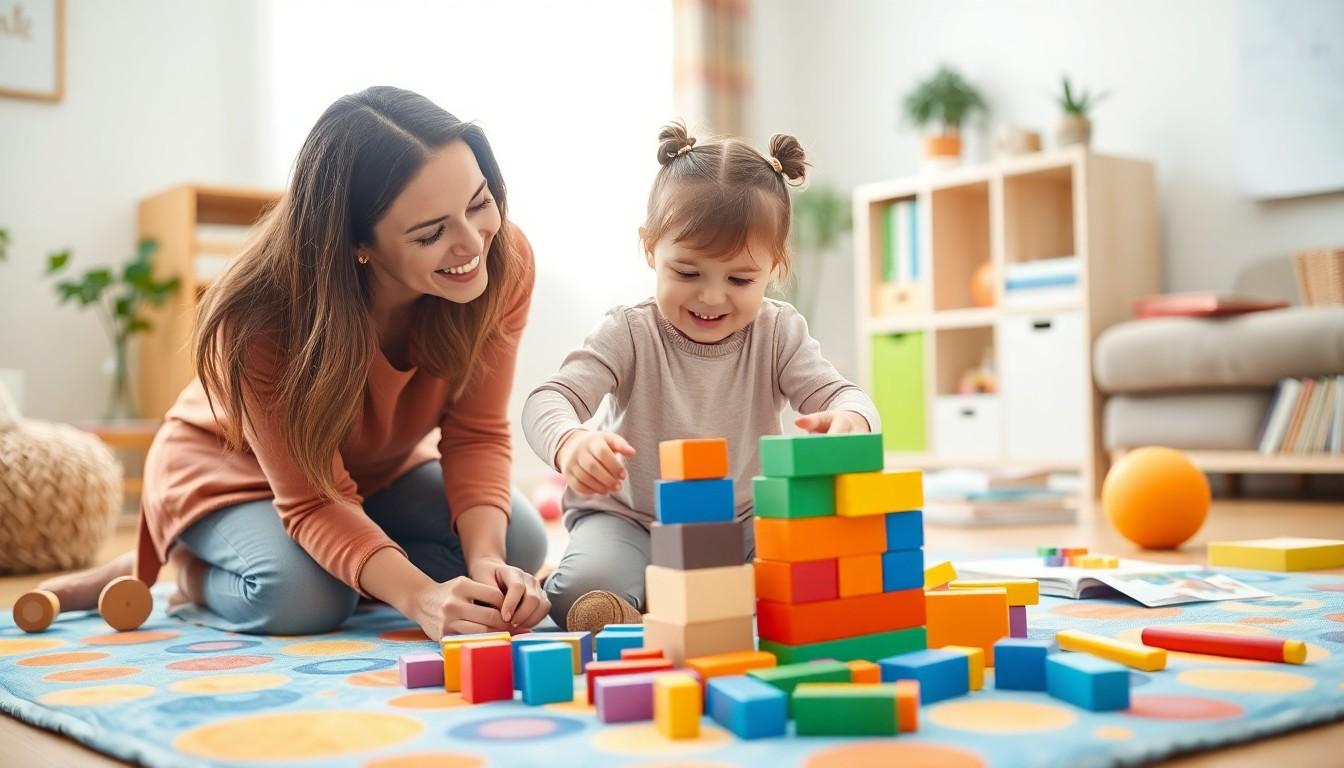Physical Address
304 North Cardinal St.
Dorchester Center, MA 02124
Physical Address
304 North Cardinal St.
Dorchester Center, MA 02124

Navigating the wild world of toddler parenting can feel like trying to herd cats—adorable, chaotic, and just a bit unpredictable. As little ones explore their newfound independence, parents often find themselves in a daily comedy of errors. From epic tantrums over snack choices to the mysterious disappearance of favorite toys, every day is an adventure filled with laughter and, let’s be honest, a sprinkle of exasperation.
Understanding toddler development is crucial for effective parenting. This stage encompasses significant growth in various areas, including physical, cognitive, and emotional aspects.
Developmental milestones typically occur between ages one and three. At twelve months, many toddlers begin to walk independently. By eighteen months, they often expand vocabulary, using simple words like “mama” and “dada.” Near the age of two, they demonstrate increased independence, showing preferences for certain toys or activities. Potty training usually starts around two to three years, marking a key transition. Overall, monitoring these milestones helps track progress and address concerns.
Emotional growth presents unique challenges for toddlers. They start to express complex emotions such as joy, frustration, and jealousy around twelve to eighteen months. Tantrums often occur as toddlers learn to navigate their feelings. By two years, social interactions become more significant, with children showing interest in sharing and playing with peers. Empathy begins developing around this age, paving the way for understanding others’ feelings. Encouraging emotional expression provides toddlers with essential tools for social interactions.

Effective communication fosters understanding and strengthens connections with toddlers. Implementing specific strategies can enhance the overall parenting experience.
Communicate understanding through eye contact and open body language. Reflecting back what toddlers say shows attentiveness and validates their feelings. Asking open-ended questions invites more conversation; it encourages toddlers to share their thoughts and emotions. Remember to pause and give them time to respond, as toddlers may take longer to express themselves. By consistently using these techniques, parents can create an environment where toddlers feel heard and valued.
Support toddlers in expressing feelings by providing simple language options. Offering choices in words helps them articulate emotions better. Promoting activities like drawing or role-playing can also encourage self-expression. Reinforcing their attempts at sharing feelings, regardless of clarity, builds confidence. Observing their behavior during play can provide insights into their emotions, facilitating conversation about those feelings. By creating opportunities for toddlers to express themselves, parents nurture emotional growth and enhance communication skills.
Positive discipline fosters respect and understanding between parents and toddlers. By using appropriate strategies, parents can guide their toddlers through challenging moments while promoting healthy development.
Establishing clear boundaries helps toddlers understand expectations. Consistent rules provide stability, making it easier for toddlers to navigate their environment. Parents should communicate rules in simple language, making them understandable. Reinforcement of these boundaries through positive feedback encourages toddlers to follow them. For example, praising a toddler for sharing toys strengthens the concept that sharing is a positive behavior. Frequent reminders about the boundaries foster a sense of security.
Time-outs serve as an effective way to address negative behaviors. These brief pauses allow toddlers to cool down and reflect on their actions. During time-outs, parents should explain why the behavior is unacceptable, keeping the explanation age-appropriate. It’s crucial for time-outs to be short, ideally lasting one minute for each year of age. Afterward, parents can encourage toddlers to express their feelings about the incident, promoting emotional literacy. This strategy not only addresses misbehavior but also fosters self-regulation skills over time.
Promoting healthy habits in toddlers encompasses nutrition and physical activity. Establishing these habits early significantly impacts their growth and development.
Balanced diets are crucial for toddlers. Parents should offer a variety of fruits, vegetables, whole grains, and lean proteins. Foods like apples, carrots, oats, and chicken provide essential nutrients. Serving meals at regular intervals helps create structure. Portion sizes should match a toddler’s small appetite, aiming for kid-sized servings. Introducing new foods may take time; persistence is key. Encouraging meals together fosters healthy eating habits and family bonding. Involving toddlers in meal preparation increases their interest in food choices.
Physical activity plays an essential role in a toddler’s health. Engaging in play promotes both physical well-being and social skills. Activities like running, jumping, and climbing enhance gross motor skills. Parents can create obstacle courses or enjoy family walks to make exercise fun. Limiting screen time to no more than one hour daily helps encourage outdoor play. Offering a mix of unstructured and structured activities supports exploration and creativity. Establishing a routine around daily activities encourages toddlers to stay active and develop healthy habits early in life.
Building strong relationships with toddlers fosters trust and emotional security. Engaging in meaningful interactions enhances their development and nurtures a positive environment.
Choosing quality time activities strengthens the bond between parents and toddlers. Reading together cultivates language skills and imagination. Playing simple games encourages cooperation and problem-solving abilities. Sharing art projects promotes creativity and self-expression. Cooking simple meals together introduces nutrition concepts while offering fun, hands-on learning. Attending outdoor activities allows for exploration and physical development.
Maintaining consistency in parenting practices supports a child’s sense of security. Clear routines provide structure, helping toddlers know what to expect daily. Setting predictable rules helps them understand boundaries, reducing anxiety. Regularly communicating expectations fosters a sense of stability. Following through on consequences enhances their understanding of actions and outcomes. Inconsistent responses may lead to confusion, making it challenging for toddlers to learn acceptable behaviors. Establishing consistent reactions reinforces trust and strengthens the parent-child relationship.
Navigating the toddler years can be a delightful yet challenging journey. By embracing the chaos and understanding developmental milestones parents can foster a nurturing environment. Effective communication and positive discipline strategies play crucial roles in building trust and emotional security.
Encouraging healthy habits and engaging in quality time strengthens the parent-child bond, promoting overall well-being. With patience and consistency parents can create a supportive atmosphere that allows toddlers to thrive. Ultimately, these foundational years set the stage for lifelong growth and learning.